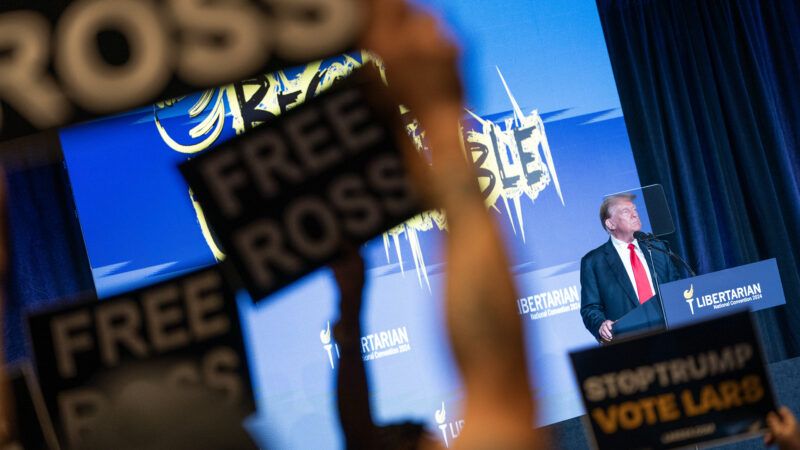Trump, Who Wants To Execute Drug Dealers, Promises To Free Ross Ulbricht
Ulbricht is serving two life sentences plus 40 years in connection with the Silk Road, an online marketplace he founded and operated where users could buy and sell illegal substances.

"We're going to be asking everyone who sells drugs, gets caught selling drugs," former President Donald Trump said in November 2022 as he launched his 2024 presidential campaign, "to receive the death penalty for their heinous acts."
That promise was not an offhand remark; it has been core to Trump's platform. Which made one of his comments yesterday at the Libertarian National Convention all the more interesting. "I will commute the sentence of Ross Ulbricht," he said, referring to the man serving two life sentences plus 40 years for a slew of convictions, including distributing narcotics. Ulbricht's legal troubles stem from an online marketplace he founded and operated called the Silk Road, where users could buy and sell illegal substances.
Ulbricht has long been of interest to libertarians, many of whom have been dogged about their belief that his sentence was perversely disproportionate to his actual conduct. Taking Trump's words at face value, it would appear the former president agrees, at the very least, that the nearly 11 years Ulbricht has served are sufficient punishment. That is hard to square with his supposed view that people who sell drugs should be put to death.
The inconsistency here may be puzzling, but—as Reason's Jacob Sullum highlighted last year—it isn't new to his remarks on Ulbricht. While in office, Trump famously commuted Alice Marie Johnson's sentence after she was sent to prison for life without parole for her alleged role in a cocaine conspiracy. He widely touted the move (which was the right one) as a sign of his saner approach to criminal justice.
Not long after, Trump signed legislation that bolstered that narrative: the FIRST STEP Act, which lessened several mandatory minimum sentences and increased "good time" credits, among other modest provisions. It remains one of the more lasting and effective parts of Trump's legacy, particularly when considering the very low recidivism rates for those released under the law.
Now Trump, it seems, would allegedly pursue policies that would have many of those same beneficiaries killed. That would include not only Johnson but also the bulk of the people who were set free by the FIRST STEP Act, the majority of whom were serving time for drug trafficking offenses. It would almost certainly include Ulbricht, one of the more famous drug offenders on the planet.
Trump also attempted to pull off this balancing act while he was in the White House. "We have to get tough on those people. We can have all the blue ribbon committees we want, but if we don't get tough on the drug dealers, we're wasting our time. And that toughness includes the death penalty," he said—in 2018, the same year he commuted Johnson's sentence and signed the FIRST STEP Act.
It's possible that the former president's drug-warrior rhetoric is another part of the flamboyant performance art that has become one of his defining traits. Whether his Ulbricht promise is yet another element of that, just on the flip side of the coin, remains unclear—although one possibly instructive fact is that Trump had the opportunity for four years to sign such a clemency grant and opted not to.


Show Comments (71)